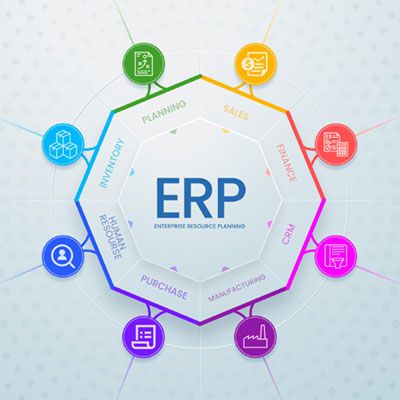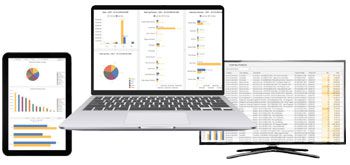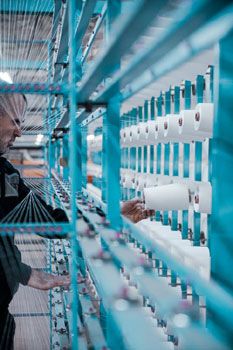Subscribe & Follow
Trending


 New Chinese cars are everywhere – but are they tough?Nicholas Pillay
New Chinese cars are everywhere – but are they tough?Nicholas Pillay


Jobs
- Sales Representative Port Elizabeth
The bountiful benefits of integrating ERP with other software, and why you should
Right?

Well, the one unifier across industries, teams, and departments is the trusted enterprise resource planning system (ERP).
The beauty of the ERP is that it collects, stores, manages, and analyses data from many business activities, all 'under one roof'.
So, accounting, estimating, sales and customer relationship management (CRM), production, stock and inventory management, purchasing and supplier management, automatic reports and analytics, all in one system.
Businesses install an ERP system because it simplifies, it clarifies, it centralises, it organises, it optimises complex operations, and then goes on to improve efficiencies and profitability.
What’s not to love?
Look, I could go on for days about the benefits of an integrated ERP. But to save time, here’s a quick glimpse.
Integrated ERP systems, such as QuickEasy BOS ERP, come preloaded with all the business modules in one easy-to-use system. You don’t have to buy modules later on.
Brilliant! However, this article is not about that. No, today we review the benefits and the very real need to integrate your all-in-one ERP with other software.
“But,” I hear you interject, “if integrated ERP is so all-inclusive, why must I integrate it with other stuff?” Good question. Read on.
First, let’s define ERP integration
ERP integration is not the same as an integrated ERP. I hope I haven’t lost you already.
ERP integration is the bringing together of a company’s ERP system with other systems, such as your e-commerce solution, or an EDI platform (electronic data interchange).
As with system integration (SI), where the various IT systems and apps within the business are connected and unified, the point is to make these systems “talk to each other”, automatically transfer data between them, and allow them to work together seamlessly.
This creates a true “single source of truth” across fractured, complex business operations.
The types of ERP integration and their benefits
Let’s quickly delve into the types of ERP integration so you get an idea of what this looks like in real life.
E-commerce ERP integration
When businesses offer online ordering or shopping, it produces important data such as leads, customers, orders, transactions, and shipping.
What do you do with that data - does it just sit in the ecommerce platform on its own? When you integrate your ERP BOS with your online ordering system, it ensures that information is sent to all relevant parties: warehousing, invoicing, marketing, etc.
E-commerce stores are typically built on platforms such as Magento, Shopify, and SAP Hybris. These tend to generate huge volumes of information on the front end. Processing all that data without ERP integration is extremely difficult.
Why e-commerce ERP integration is good for you
- Front-end data becomes uniformly available across departments.
- Inventory levels are automatically updated on both the front end (e-commerce) and the back end (ERP).
- Real-time, customer-specific, dynamic pricing is possible.
- Contingencies in cases such as a stock outage, are straightforward to execute.
EDI ERP integration
Electronic data interchange (EDI) facilitates the transfer of electronic data between suppliers, distributors, and trade partners with your organisation.
The instantaneous communication of purchase orders, transactions, shipment details, and inventory levels between organisations and partners is essential for optimal supply chain management.
This is massively facilitated when EDI is integrated with your back-office system (ERP).
Why EDI and ERP integration is good for you
- Immediate transfer of data among business partners
- Seamless order management
- Data communication on inventory, orders, invoices, shipping (and much more) becomes more accurate, which results in a greater trust in the data received and transmitted
- Improved supply chain and logistics for your organisation
EAM ERP integration
Enterprise asset management (EAM) is asset management software that helps with the big, heavy equipment most manufacturing and engineering firms use in their day-to-day production and operations.
Integrating the ERP application with the EAM system, which synchronises inventory, logistics, human resources, and other relevant data with the ERP system, can optimise and improve all activities relating to handling companies' assets, such as inventory management, supply chain, demand planning and forecasting, and maintenance management.
Why EAM ERP integration is good for you
- Maintaining synchronisation between physical and financial assets for asset maintenance management.
- Planning human resources for asset management requires advanced planning.
- You are able to do the extensive planning required for inventory management well in advance, as the ERP stock data point is in line with the EAM.
How to know if you need ERP integration
So, you now know what ERP integration is, and the types of integration you can get. But how do you know if you really need it?
Here are some clues if your company needs ERP integration across systems.
Manual data capture and dataflow
If someone in your company has to manually capture information from one system to the next - such as ecommerce to inventory - you need integration. This is taking up way too much time, costs you too much money, and opens you up to error and risk
Error-prone operations
Whenever people are involved in manual data entry (as above), you’ll find mistakes. Costly ones. Incorrect or missing customer and product data is input into your ERP system, which means departments work with wrong information, which cascades into a host of other problems.
Blinkered data and manual reports
ERP systems automate reporting, have live dashboards, and give decision-makers access to real-time data. However, when non-communicative systems are not updating the ERP due to non-integration, the risk is there that managers and key stakeholders hold dated, irrelevant, or even worse, blinkered information in their hands. This limited view threatens company relevance and competitive dominance.
Stalled team collaboration
To work together with the same objective, intensity, and without conflict, it is imperative that data is consistent between systems. In this scenario of inventory management, team collaboration would be hampered without ERP system integration:
- A product has gone out of stock in the e-commerce store.
- The sales team asks the stock management team to check that the product stock is maintained.
- Inventory finds availability in the ERP product section, then contacts the sales team to ask them to recheck the e-cCommerce stock availability.
- This ping-pong series of communication continues, which leads to wasted time, mounting frustration internally and with customers, and a reduction in productivity and business revenue.
The top five benefits across the board of ERP integration
Here is a summary of how integration of your ERP system with your other business systems will benefit your team, your business, and your bottom line.
More productivity
Probably the best thing you’ll get from ERP integration is time. Time to do more productive, lucrative tasks. Time to focus on what matters most.
Think of how much time you give your teams to do their core work when data entry, order processing, order fulfilment, and reports are automated.
Better sales on the road
Your sales reps need the most updated stock and price information with them when they see customers or close deals out on the road.
If your ERP system talks to your online ordering solution, they not only see the latest stock levels and pricing, they also have access to accurate customer data.
This helps them tailor their approach, sell more, protect brand reputation, and worry less about if they have accurate data on stock availability and prices.
Less risk, more visibility
When your business systems are fully integrated, you protect yourself against mistakes, inefficiencies, and the cost of poor productivity due to human error.
By integrating ERP, you are able to manage all your data in one system and propagate it to your other systems and back. This not only reduces manual data capture, it gives you full visibility across the business.
Reduced disruption for employees
When your various systems are integrated with your ERP, your teams can continue using the systems they are used to, without having to learn and maintain other systems.
This means, no downtime, no disruptions, and uninterrupted productivity.
Personalised customer experience from start to finish
When CRM, e-commerce, courier solutions, etc and ERP are integrated, you are able to give your customers exactly what they need, how they want it, when they need it. You can even offer your customers self-service portals - providing this level of personalisation makes them more likely to become loyal customers.
Conclusion
You probably already have some kind of an ERP system in place.

If you don’t have a business operating system (BOS), or you have an old ERP system (one that was designed from the ground-up for you, is pretty inflexible, and doesn’t like talking to other software systems), then you need to talk to a trusted ERP vendor who can partner with you to fix that sooner rather than later.
A modern ERP system - whether cloud-based or locally installed - automates and simplifies complex business processes. This makes the business more efficient and profitable.
But, you might not be getting the full value of your ERP. To do so you must integrate it with the rest of your business’s systems and applications.
Speak to your ERP and BOS partner about how you can get your various systems to talk to each other, and reap the full benefits of your ERP.
- Integrated accounting for printing companies18 Jun 10:37
- How to choose an MIS or ERP system13 May 11:35
- From sales to accounting, how MIS helps printing companies navigate complexities12 Apr 12:50
- How SA’s digital services and manufacturers use software to optimise production14 Mar 13:04
- From prospect to profit – why sales, CRM, and service desk software matters13 Feb 13:24

















